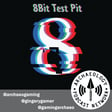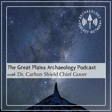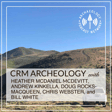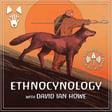Become a Creator today!Start creating today - Share your story with the world!
Start for free
00:00:00
00:00:01

Augmented Reality Games and Archaeology - Episode 9
At the 2018 Society for American Archaeology meetings in Washington, D.C. in April, APN founder Chris Webster sat down with archaeogamingenthusiast Adam Spring to talk about Pokémon Go and whether it helped destroy historical and archaeological sites as was predicted in the summer of 2016 when it was released. They also talk about other augmented reality games and their potential impact on history and historical sites.
Transcript
Introduction to the 8-bit test-pit podcast
00:00:00
Speaker
You're listening to the Archaeology Podcast Network.
00:00:08
Speaker
All right, this is Chris Webster, and I have never hosted the 8-bit test-pit podcast before. However, since we haven't had an episode out in a speed in a long time, I thought I would bring on somebody I know who posts about gaming quite a bit and is also an archaeologist and familiar with this thing. And we're both at the... We're actually recording in my room at the Marriott Warman Park Hotel for the Society at the Society for American Archaeology Conference in Washington, D.C. 2018 on April 15th.
Pokemon Go and Archaeology: A Connection?
00:00:37
Speaker
And the subject of Pokemon Go has come up for me recently. And I remember people talking about this a long time ago, so we're gonna talk about that. But first, my guest and sort of co-host for this, because I'm not really gonna direct a lot of questions, we're just gonna have a conversation, is Adam Spring. Welcome to the show, Adam.
00:01:11
Speaker
you know the poke stops in the gyms and things like that being located at historical places but you have some knowledge of
Development and Impact of Pokemon Go
00:01:18
Speaker
how this kind of developed and maybe why those things are there uh... or you know where that word where the company that develop a mongo kinda got all this let's start right there and and do you have so basically you know unfortunately got terrible sort of internet in this room so i can't basically look up and look up some of the facts but um... it's i've written about this quite a bit was based on something called ingress which essentially is uh...
00:01:18
Speaker
I'm happy to riff with you. Not a problem at all.
00:01:41
Speaker
basically a lineage thing from Keyhole, which became Google Earth. So Michael Hunk, I believe his name is, if you go to my medium page, I've done a recent update on this. So all the information's there, including connections to Ingress. He basically decided, you know, he was in Google, he'd taken Google Earth as far as he could go, and he wanted to do something next. So he went to his bosses and he said, okay, I'm going to go off and do a startup. And they're like, okay, how about we fund it?
00:02:09
Speaker
So a Google startup called Niantic Labs. Now, the archaeological interest for that is the fact, and again, if you go to my Medium post, I talk about this, there are parts of San Francisco that are actually built on reclaimed code land. So there are actually a load of old boats from the 1850s relating to the gold rush. And then Niantic was basically one of these things.
00:02:31
Speaker
And the reason why he called it Niantic Labs is because it was this idea of things being there in the background where you could walk past it every day, but it was still there. So Ingress, which what Pokemon Go is basically built on, it is literally Ingress, but with Pokemon instead of Ingress. The old idea behind it was taking his knowledge of digital mapping and using that to try and solve the problem of, okay, everybody's got smartphones now.
00:03:01
Speaker
They're starting to not want to engage with each other in a public setting. They might try to be on their phones. So let's create a narrative and superimpose it onto maps. So what Ingress was, was actually taking the idea of an alien race would come to Earth and there would be two teams. You would either be in the faction that you've seen them as a force for good, or you've seen them as a, you know, the pipe way of putting it, force for bad.
00:03:25
Speaker
And essentially what he did is he created an entire narrative around this. And you know, there's also videos and continued updates even to this day, you know, timestamping this in April of 2018. There's new updates and changing rules. And you know, from the discussions we were having off mic, clearly they're now doing that with Pokemon Go again, because the key thing behind all of this, regardless of whether you're using your phone or your tablet or augmented reality,
00:03:49
Speaker
fundamental thing is about relationships between people and how you can basically use technology as a means of supporting the sustaining community. Yeah. And that's a really good point because that's, you know, I, I didn't, my, my wife downloaded Pokemon
Pokemon Go vs. Geocaching: Similarities
00:04:04
Speaker
Go. She had a bunch of friends that were playing it when it first came out and I was just like leering at her going, Oh, you know, do you just, what are you doing? You know, put your, put your head up, you know, focus on what we're walking in here. She's playing this, she's doing this thing.
00:04:16
Speaker
And then she kind of let it die like a month and a half later. I think a lot of people jumped on the bandwagon and then let it die. Well, it came back into Focus Force a few weeks ago and I downloaded it just to see what it was. And I actually, to speak to the bringing people together aspect of it, I've done a lot of geocaching in my life. And one of the things I love about geocaching is that when I go to a new place, I actually strangely haven't done any here because this conference has been so busy.
00:04:43
Speaker
Yeah, usually I'll pull up my app and you don't even need a GPS anymore. You just pulled the app. Yeah. And these things, this world of small hidden containers is around you and nobody else knows it. It's almost like this fifth dimensional thing. That's just like,
00:04:58
Speaker
layered on top of reality and that's what geocaching it's very similar well and then and then go to Pokemon go it's layered on top of maps like you said yeah and the whole concept of like and I love tying this back to archaeology and the thought that pretty much everywhere you go there's stuff under you that's historical absolutely you know and I mean they're they're digging up stuff in New York City yep built on top of the old city and finding not only historic but prehistoric remains in San Francisco is the same way like you said
00:05:26
Speaker
And a lot of places are like that, where there's just stuff underneath us that we're aware of, this other layer of reality in the past that's there. And one of the things I like about just looking at Pokemon Go is that it is built on a layer of reality, but there's this almost other dimension of creatures and beings that live in this thing.
Augmented Reality in Popular Culture
00:05:46
Speaker
And if you have the viewer, which is the Pokemon Go app, another thing that's reminding me is, did you see Valerian?
00:05:51
Speaker
Not seen it yet. Well, I'll just tell you one scene in Valerian. They're basically in this desert, this big walled enclosure in this desert. And people are just milling around. But if you have the actual, it's an actual other dimension. So it's this huge basically shopping mall with like over a million stores or something like that. And you put on this device and you're transported to this other dimension, but you're still like right there. But your body projection is in this other dimension and you go shopping and then you come out through the dimensional portal and you bring your other dimensional objects and it converts them into three dimensional space.
00:06:21
Speaker
And that's kind of how I see it. It's kind of neat to do that. And then the whole community aspect of bringing people together, we'll get into. Yeah. Well, I think that the two things, the mixed reality element to it. So there's a couple of stories with this one. On the Pokemon Go thing, as we were discussing previously, you can be in public spaces and you'll see a group of people walking around, like for example, near
00:06:46
Speaker
where I live, there's a town and I knew there was a Pokémon Go gym there. And ironically enough, they'll place them in certain places like this was outside of a police station. So like the teenagers, they could have fun, but they wouldn't have too much fun, you know? So I knew there was a Pokémon gym in this town. And then one day my wife and I were just walking around.
00:07:04
Speaker
And it was like this herd of people, like following stuff around with their phone and it's like, okay, this is clearly something going on with Pokemon in here. And, you know, like we were discussing before, they're now making efforts to sort of keep it fresh and keep it going. So they're changing the rules and they're making community events and things like that. So one of these things were going on. So, you know, you've got the mixed reality element to it, but you've also got what Doug Engelbart called something
00:07:25
Speaker
called the augmentingly collective IQ. So you've got people coming together and using devices as a facilitator. So as a transmitter and a receiver of knowledge, or again, coming back to that point about what anchor was trying to do is actually bringing people together. So you've almost got like this little subtle sort of way of, okay, you guys would otherwise maybe be inside gaming and talking to each other online, but I'm actually going to get you outside
00:07:52
Speaker
physically being together, you know?
Pokemon Go's Social and Historical Engagement
00:07:54
Speaker
And then the other thing about what you were saying as well, when you were discussing some of your points, I was actually thinking about a friend of mine when I introduced him to Ingress, and this is 100% absolutely fact honest. He actually drove around his town and in terms of geocaching,
00:08:11
Speaker
the dual-like things you can collect, he actually created a Pac-Man throughout his entire time. He actually spent an entire evening driving around so he could basically geocache an image of Pac-Man. So if you went in and looked at Billings, Montana at one stage, basically you would have seen a giant Pac-Man in Ingress. That's amazing. Yeah.
00:08:32
Speaker
Speaking of the go back to the community aspect of stuff. I think as with most video games you've always got a few people that are just super hardcore and like especially with online gaming these days and opening it up to you know back in the day when it was just your local arcade.
00:08:50
Speaker
and it was just the local people. You probably knew who was on the tie score list, right? Absolutely, yeah. But now, it's a percentage of people that you'll never know, and it's probably an 11-year-old autistic kid. I mean, honestly, to say that, people that just super laser focus on something, and you get so good at it that nobody can touch them, well, Pokemon Go's probably got the same thing. They got a bunch of people, level 40's like the highest you can get, and it's logarithmic, so it takes a long time to get there.
00:09:17
Speaker
You get those people that are just either been playing it for a really long time. Well, it's only been out a year and a half, but they've either been playing it for the whole time or they just got super laser focused. But then there's the rest of everybody else who maybe kind of picks it up every once in a while. And those people, I think, are the ones that that we should focus on from a historical standpoint, because there's there's a gym and a focus stop like right at the arch in downtown Reno, the Reno arch. The arch is like across the street from where we live. So yeah.
00:09:45
Speaker
And on one of these buildings is, I actually don't know the full history of it, but it fastened into the wall as like a recreation of like the Blarney Stone in Scotland and... Ireland. Sorry. Sorry, you're talking to a Brit. You're talking to a Brit. I'm sorry. I'm sorry, yeah. I should edit that out, but I won't.
00:10:05
Speaker
So it's right on the wall there and people come up and touch it and stuff But that's in one of the images on the on the pokey stop and for the really to the gym as well So I think I think that these things are good going back to the historical aspect of these stops and and how they're created there I think that I think it's actually a good thing nowadays now that the kind of craze is over Yeah, you'll have the crazy people that are going to these things. They're not focusing on where they're at or what they're doing They don't care about interacting with other people. They're just collecting
00:10:32
Speaker
you know, Pokemon and doing their thing and collecting experience points. But other people are going to go there and they're actually interacting with the things and the stuff that they're around. And I think that's a great thing. And also with these community days and the new, like, I guess newish raid battle thing that they came up with like a few months ago is there's a certain timeframe where the only way you can beat the thing at the gym is to collect a whole bunch of people together with you. Like you can't do it by yourself and generally. Yeah.
00:11:00
Speaker
It brings people together. Sure, for the time that they're doing it, they're all heads down and focused, but they're working collectively as a team, a group of people that don't know each other. And then when it's over,
00:11:10
Speaker
You can't play again, you know, so you lift your heads up and oh, hey, how are you doing? Yeah, yeah, yeah, yeah, yeah, absolutely. And maybe if more archaeologists and people interested in history were not shunning these things but engaging in these things, when everybody lifts their heads up after the battle is over, you can be like, hey, did you know we're standing on a historic location here? This is part of the history of our city. This is the whatever. And you can engage people that way.
Archaeology in Video Games: A Learning Tool?
00:11:37
Speaker
This is another way for public engagement, really.
00:11:39
Speaker
Yeah, and I mean, archaeology is an interesting example because we're talking about Pokemon Go, we're talking about AR augmented reality, and I think from a communal aspect, it's easier to see the long-term value of AR than virtual reality. Virtual reality is still a very individual thing.
00:11:55
Speaker
Even back in the 90s, you look at the video game industry, they were trying to crack the problem then and it wasn't cracked then. To be honest with you, even now, it'll stay around for a while, but I don't see it being easily to be mass adopted. And I think coming back to the point of view from Pokemon Go and the AR thing, there's two things there that are immediately apparent in the sense that you've got the edutainment.
00:12:19
Speaker
value of it. So you're going around a site being able to, you know, put your phone up to a board and maybe have somebody talking to you. And, you know, that isn't science fiction. If you get a bottle of wine called 19 crimes, they've actually created a thing where you actually, if you put your phone up by the label,
00:12:36
Speaker
then the person that was the convict from Australia will start talking to you and telling them the life story. So you've got the digital narrative elements of it. And then if you look at video gaming in itself and look at something like Assassin's Creed, the latest Assassin's Creed as of us talking in April 2018,
00:12:54
Speaker
they actually employed an archaeologist to look at the reconstruction of memphis and i only know that i've never played assassin's creed but i had a friend of mine who did his phd in egyptology and he was like calling me saying this is fantastic my phd was on memphis and they have done a totally sort of accurate based on the fact we have reconstruction of the site and that and that's fantastic because
00:13:16
Speaker
People, the quote general public, people who aren't doing history and archeological analysis and interpretation for a living, they generally just want experiences. I mean, sure, they'll sit down in front of a TV show and watch something for a while, but really people learn through experiences. And I think if you can, this is really the thesis of the whole archeo-gaming thing, but if you can accurately create an environment that people can interact with,
00:13:46
Speaker
And as long as you manufacture that interaction in a way that's not like disrespectful to the environment in a way, like I suppose in Assassin's Creed, I've never played that either, but I assume it's a first person shooter type of game. Someone running around sort of, I think. Right, right. And some people might have objections if you're, you know, if you've got historically accurate recreations of like monuments and things like that and buildings and historical structures and somebody shooting them up or running a car into them.
00:14:11
Speaker
Yeah, that could be an issue. But if you create the narrative in such a way and you tell people this is an actual real place and it's not just a video game, it's a video game layered on a real place, that's hard to see in video games like that because they probably don't make that blatantly obvious. Somebody in Korea playing it might know, oh, this is Memphis.
00:14:30
Speaker
Do they really process the fact that this is an actual city and these are actual buildings? This is really what it looks like. That's one thing I like about Pokemon Go is that while they don't have virtual reconstructions of buildings in there, you've got the layout. You can tell where you're at in your neighborhood, in your town. You can see the streets, you can see the buildings. I kind of wish they had street names and stuff and really made it a true map and environment.
00:14:53
Speaker
People are freaked out about privacy because i'd also like to see like ways or something where you can see almost a delayed representation where somebody has the other people. Yeah exactly so.
Future of Augmented Reality in Public Engagement
00:15:05
Speaker
You know but i don't know it's just there's so many ways to involve the community engage my history we got to write.
00:15:10
Speaker
Yeah. And I think, you know, the other thing is as well, because as we were talking about off mic, one of the next things that's coming up, because our core, which is Project Tango, which was a Google 3D imaging mobile device, tablet and phone, which then Lenovo and Asus tried to do stuff, but it never worked. They did bring them out, but they basically had bellied up.
00:15:30
Speaker
Our core is now there are equivalent in the next thing to come up and you know reminded this cuz you mentioned Korea Korean team has actually used that to create a Ghostbusters app. So you know for me as a massive Ghostbusters fan you think about the ability now to actually have stapler.
00:15:45
Speaker
on a building in front of you. It kind of takes that idea of Pokemon Go and stuff like that to the next level because I mean you think about it and you think about the viewpoint of it. Pokemon is, although there is a macro element to it when you're actually engaging with the Pokemon itself, it's kind of micro.
00:16:04
Speaker
You know but to have something like the size of state to be able to look at building any he's that type thing. When you got another level i mean i got the next level of engagement using. I are on a mobile devices medium of communication i think you know if you have the ability to put him anywhere you're not just finding him somewhere you can put him anywhere i was experimenting with some air stuff when i got my phone.
00:16:28
Speaker
some apps and there was one where you could just generate like these weird animals and shapes and things like that and just have it appear in front of you. Well, people will no doubt, you know, put state puff marshmallow man on top of stonehenge or on Easter Island, you know, or something like that. Yeah, absolutely. Yeah. And some people are going to get pretty offended by that. Yeah.
00:16:49
Speaker
Yeah, yeah, yeah, yeah, absolutely. Yeah, yeah, yeah. So we gotta just be, I think on the one hand, we need to be conscious of those things, but on the other hand, we need to kind of relax about that stuff just a little bit. Yeah. You know what I mean? Yeah, no, no, absolutely. Because it's getting people engaged in a way. And I think that's, you know, we're talking at the SAAs and a lot of the digital sessions here to keep on course, but maybe go off on a slight tangent. It's been interesting because I think regardless of
00:17:16
Speaker
what you're using in terms of the digital overall, you know, whether it's AR, whether it's a laser scanner, whether it's anything else along those lines, even a camera. I think the thing to really think about is engagement and long-term narrative because ultimately that's a thing that's going to keep information flowing and start to give a long-term perspective. And I think, you know, obviously coming at it from an archeological viewpoint, you look at things like Pokemon Go, you look at things like Ingress, you look at things like
00:17:44
Speaker
hardcore and the emerging Ghostbusters app as of April 2018, a big thing there is accessibility in the sense that you can use these things on your phone. You don't need an otherwise specialist equipment, but the other side of it is as well
00:17:59
Speaker
in terms of narrative, you can use these things to engage with objects and places in a way that you haven't necessarily done that before, and more to the point, communicate it to other people that might not be archaeologists, and do so in a way where you never know. Somebody may become interested enough to actually study it more, or in terms of stewardship, education may increase to a level whereby people are aware of sites.
00:18:24
Speaker
So if something's going on and they're a bit fishy about it, they know what to do in terms of contacting people and potentially helping the preservation of a place or an object. Yeah. All right. Well, let's take a break for a second. And when we come back, I want to talk about a little bit more history and then possibly some future. Fantastic. All right.
00:18:46
Speaker
This network is supported by our listeners. You can become a supporting member by going to arcpodnet.com slash members and signing up. As a supporting member, you have access to high quality downloads of each show and a discount at our online store and access to show hosts on a members only Slack team.
00:19:04
Speaker
For professional members, we'll have training shows and other special content offered throughout the year. Once again, go to arcpodnet.com slash members to support the network and get some great extras and swag in the process. That's arcpodnet.com slash members.
00:19:21
Speaker
The Archeology Podcast Network has partnered with Tea Public to bring you some awesome gear that looks good, promotes archeology, and puts a few pennies in our pockets so you can get free podcasts. Check out our designs at arkpodnet.com slash shop. That's arkpodnet.com slash shop.
Understanding PokeStop and Gym Locations
00:19:35
Speaker
All right, we're back and we're talking about RQ gaming and we initially started this discussion with the discussion of Pokemon Go. And I want to bring it back to that real quick because I intended to ask you this early on, but do you know what the basis of and how they were decided on and how they were created and maybe how we can change and have new ones made, but the PokeStop and gym locations, how do we, do you know the history of that and why those locations are with the locations that were chosen?
00:20:03
Speaker
No, I don't. But based on what I've seen, there has been a conscious effort of thinking about community in the sense of, like I mentioned before, one of the gyms that was near us was actually by a police station. So they're thinking about, they clearly are looking at some point, you know, it's still Google based, right? So basically like they're clearly looking at demographic data in some respect.
00:20:23
Speaker
Well, and people can have them sponsored too, it looks like. The only sponsor one I've ever seen is Starbucks. Every single Starbucks has a Pokéstop and it says sponsored. Yeah. But I've never seen any other sponsored Pokéstop. But again, that's actually an interesting point because coming back to the Google thing, their main money is ad revenue. Augmented reality has become a popular thing. There are billboards where you can go... I don't remember where it was. It may have been in Europe somewhere. Anyway, there was a billboard that you could go past and if you had your phone and you had the app that they'd created, basically it would start.
00:20:53
Speaker
Showing stuff in what you wouldn't talk to you, but it would like flash stuff at you and things like that So there's clearly gonna be yeah if you wanna You know have a Pokemon gym like you said near Starbucks or a community center or anything There is clearly an ad revenue stream to that. So yeah
00:21:08
Speaker
Right, or using some forethought in this and actually applying, if you can, to have a gym or a poke stop at a historic location. But you get to decide where it's going to be. So put it in a spot where people can mill around within the sphere because you have to be in close proximity to it with a GPS on your device. So put it in an area where they're not going to damage or anything. But then like with the sponsored ones from Starbucks, I think they say something like some kind of special Pokemon Frappuccino that's not on the menu that you can go in and ask for. I don't know if you can still do that.
00:21:57
Speaker
There we go.
00:21:58
Speaker
It's a well-known area called Grimes Point. You stop on the highway that's well signed, but some people might just not stop there because maybe they're not interested. But if you put a poke stop there out in the middle of nowhere, people will stop there that are playing the game and then they'll probably stop and stretch their legs and maybe go check out some rock art.
00:22:15
Speaker
Yeah, yeah, yeah. No, absolutely. And put sponsored by the Nevada Historical Society or something like that. And now they're going to be aware that there is is a Nevada Historical Society. Yeah, yeah, yeah. No, absolutely. Yeah, absolutely. I think it can be used to our benefit rather than like we were just in the virtual and digital ethics forum at the essays this morning.
00:22:33
Speaker
And I think, and I was speaking to somebody earlier, actually, at one of the evening bar session, I think, about archaeologists in TV.
Archaeologists and Media Narratives
00:22:44
Speaker
You know, we always shun the spotlight because of shows like Diggers and things on Nat Geo and stuff like that where, oh, they're just going to misrepresent us and I don't want to ruin my academic career and I don't want to ruin my credibility.
00:22:58
Speaker
We need to probably just take those kinds of public facing things and own them and go in there and help create that narrative. And we can do that through Pokemon Go and create places for actual people to go rather than just bitching about it and own the narrative rather than just complaining about it because it's not going to go away.
00:23:17
Speaker
Yeah. And I mean, another good example of that as well is Facebook, because, you know, I've had a conversation with a friend of mine before who's an archaeologist, an archaeologist. And, you know, we were talking about, you know, I've had enough of Facebook getting on my nerves, you know, I'm thinking about leaving it. And he was like, well, yeah, you can do that. But the trouble is, if you don't engage with these things, you have no control over basically what is being presented about you or what your image is online. And I think
00:23:41
Speaker
You know, it does, it ties into a broader thing of something called the tethered self. So although there is a physical self of who we are, again, coming back to all the points we've been talking about throughout this, there's also a digital self. So it's tying into that. And I think, yeah, with the Pokemon Go thing,
00:23:58
Speaker
or anything along those lines when you start interacting with something, elements of your personality and everything else start going into it as well. You can complain about not engaging, but like you said about the TV archaeology thing, it's like, well, if you don't like it, then do something about it. And sometimes I think it
00:24:17
Speaker
It takes soft skills, you know, because I get very passionate and frustrated about a lot of the stuff that I see going on, particularly in what's now being called the digital humanities in its current form. And I could be really brash about it, but it's not going to do anything. What's actually going to do something is actually talking to people. And I think that's the primary thing. It's communication.
00:24:39
Speaker
you know, and how you frame things and, you know, for want of a better term, choosing your battles. So, you know, at least if you can make one little difference, you know, I'm kind of slightly bearing off point, but it is kind of on theme. You know, if I can make one difference with one thing about what I perceive as digital humanities and what's lacking in it at the moment.
00:25:01
Speaker
then it may not be to point Z, sorry I'm British not Z, but at least it might be to point B. And I think that's the thing that really kind of you need to think about sometimes. You can relate that back to Pokémon Go of, okay, wow, it may be people in a place looking for otherwise esoteric fictional characters, but at least they're in that place.
00:25:29
Speaker
and at least they're absorbing some element to it. They will walk away from that site or that object with some form of cultural memory associated to that and that will reap dividends somewhere.
00:25:39
Speaker
And the brilliance of the Pokemon Go interaction is that they'll return. Yeah, exactly. Because after a certain period of time, you can come back and get more things. Yeah. And we all know through advertising that it takes three or four hits in your brain. I'm just going to tell people podcast with podcast advertising. Listen, don't buy an ad for one show. Nobody's going to click on your thing. You need to hit them over and over and over again before they finally remember, oh, I need to go to this thing and check it out.
00:26:07
Speaker
Yeah, it's called sticky information. Exactly. And you know, back to your point too about engaging with people and maybe if you can only change just a little bit. You know, our time is always very busy, especially, I feel like especially archeologists, we're always working on so many things. Absolutely, yeah. And we don't have nine to five jobs and we take on too many projects and we're doing all kinds of things. So when somebody asks us to do something, we have to evaluate, is that a good use of my time? And I think
00:26:36
Speaker
One of the ways we see public outreach and engage in the public is speaking at historical society type events and things like that, which I think people should do, but the honest truth is there's maybe 20 people, if you're lucky, maybe 30 people sitting in front of you. This is why when I have done those speaking engagements, I've recorded it and I put it out as a podcast and then 5,000 more people get to hear it, right? So if you can't do that though,
00:27:02
Speaker
choose to spend your time on doing things that will engage more people. And your point to Facebook, I just, I pulled up a statistic for the thing this morning that was active.
Facebook's Influence and Privacy Concerns
00:27:11
Speaker
That was, it was numbers as of the fourth quarter of 2017, which are probably lower now, given the Facebook mass exodus a little bit that's happening the last couple of months.
00:27:20
Speaker
There were two point two billion monthly active users and monthly active user. In the in the app development world is is defined as somebody who's logged into the platform and used it within the past thirty days yeah yeah that is phenomenal that's a quarter of the world's population logged into facebook in the last thirty days you're telling and people say it's not effective and i don't want to be on there and i can't do any good on there.
00:27:41
Speaker
Yeah. Well, I mean, the other thing about Facebook as well, because obviously the stuff that's been going on recently as of April, again, time stamping this 2018, you know, is I think the thing we've got to remember is it's not going anywhere because the infrastructure is there in whatever form it is. It's kind of like if you go to a place and it's, you know, people have had like a company, the buildings are there, they built the buildings, but then the company goes bankrupt.
00:28:09
Speaker
Those buildings are still there. The infrastructure is still there. It's still going to get used for something. And yet with Facebook, I think the interesting example about that is.
00:28:18
Speaker
The ultimate thing, I think, with Facebook is it would be very telling if they finally let people delete their account without having to communicate with them. Because you can actually delete your Facebook account unless you go to them and you say, look, I want this deleted and then you have to give them a reason why. So the fact that that hasn't changed, although you may have people like at the moment, oh, I'm no longer on Facebook. I'd be willing to bet 80% of them will end up back on Facebook at some point. You know, the interesting thing about that is, though,
00:28:46
Speaker
Like we're so concerned with our, with our personal data, you know, on Facebook. And yet how many people do you know have like, when they filled out their Facebook profile, like their, their full, full name is their name on Facebook. Like, I don't know how many white people do that. Their full name, unabbreviated first name, middle name, and full last name are all on Facebook. And then you look in their birthdays on there where they were phone numbers, everything else, everything publicly visible, right? With most people, why did they fill out all that willingly?
00:29:14
Speaker
Yeah. And then coming out, coming back to the geocaching as well, every single location they're at, they're tagging themselves in and saying, I'm here right now. I'm here right now. I'm here right now. And we seem to be hyper concerned with that. And yet every, nearly every retail business we walk into has us on camera. And we don't go back to them a week later and say, delete the footage you have of me going into your store. But we want Facebook to delete the evidence that we were in their store. Facebook is a for-profit company that we choose to patronize. Absolutely. Yeah.
00:29:40
Speaker
And yet, and yet we're hyper concerned. It's my data. No, it's not. It's actually Facebook's data that you willingly gave them. But it's also, it's how the information is presented to you. And I think coming back to the Pokemon Go stroke ingress thing, you know, you think about the visualization of data with that. There's a buffer in the sense or a mental buffer in the sense that it's a game, right? And you're interacting with it for fun. There's an indoor from rushing everything out.
00:30:02
Speaker
If you were to turn around to somebody with their facebook date and say right. This is what twenty eighteen look like for you you are here on this day at this time doing this doing that freak out. Yeah.
00:30:13
Speaker
They totally fit, but because there's, you know, you think about the way Facebook is, it's pretty, you know, there isn't, I mean, there's plenty of visual there, but there's no real detailed visual stuff, you know, or the wall process of whereby you'll have a map and it will say so and so is here at this time. That then basically just gets the next feed that goes down, you know, it's three or four posts down and stuff like that. But if you were to actually say that, right, well, I've taken all your location stuff from this time and day and this is where you were. And did you enjoy that coffee in Starbucks on that day at that time?
00:30:40
Speaker
They would think about it a little bit differently, you know, they would and you know at the same time though when I'm when I'm searching something on Amazon and then I flip over to Facebook and there's an ad for what I was searching for right there in my feet. Yeah, I Actually don't I don't get freaked out by that too much. I appreciate that. I don't have to see ads for stuff I don't actually want. Yeah, you know, I appreciate that they're targeted and I am strong enough I guess psychologically with my purchasing power to say I
00:31:06
Speaker
I'm not gonna succumb to this, although sometimes I have. I've been looking at something and saying, I don't know if it's the right time, maybe I'll wait a little while, and then I see it 75 more times on Facebook. Okay, click. That being said, all of us, just about everybody, if you were to ask them if they could own their own business and work for themselves, they'd probably say yes, because people want to work for themselves,
Targeted Ads and Consumer Behavior
00:31:28
Speaker
right? They don't wanna have a boss. And if you had any sort of business that dealt with customers,
00:31:34
Speaker
you would understand the value of understanding more about those customers. The more you know about your customers and what their actual needs are, the more you can get what you have straight to them. And everybody gets that. And yet we're all also afraid of it being done to us. And it's a weird thing. Yeah, absolutely. I mean, the retail store example, if I owned a 7-Eleven and I knew walking in the door,
00:31:57
Speaker
that you wanted a hot dog, I want there to be a hot dog in front of your face. So you don't have to go anywhere for it. You don't have to second guess it and buy something else. You're going to buy a hot dog because it's right there. If I know that when you walk in,
00:32:10
Speaker
You know, coffee shops do that all the time. Your barista, if you go to the same coffee shop, the good baristas, I used to go to this one all the time and I have a drink I usually get, you know, with wherever I go. And the good baristas, if you're regular, I mean, they're making it, if they're not busy, they're making it when they see you pull in. Yeah, because they know what you want. And it's ready there for you. And yet we consider that a courtesy. But when Facebook delivers us the ad that they think we want, we consider that an invasion of our privacy.
00:32:38
Speaker
Yeah, yeah. It's weird. Yeah, it is weird. It is weird.
Cultural Nostalgia in Pokemon Go
00:32:41
Speaker
But then again, I mean, you know, coming back to the Pokemon Go thing, it's like it is just Ingress with Pokemon instead of Ingress. Yeah. But everybody, you know, there was a cultural memory associated with Pokemon. So it was kind of funny for me when the New York Times just there was this massive explosion in a short period of time of like Pokemon Go, this massive craze.
00:33:03
Speaker
But there are only a few articles that actually said, well, it was kind of this beforehand, and then it's finally it's made it work for this company. Right. You know, right. So, yeah, it's it's interesting how we sort of, yeah, how we could like coming back to the Facebook thing. And that's interesting. It's interesting how we think about things as humans sometimes. Yeah. It's archaeology, right? I know. I know. So.
00:33:27
Speaker
Alright, well, I've probably got to get rid of this room here shortly, and then we'll go. But I'm hoping to have Adam on some more, either on the 8-Bit Testament podcast or on some other shows. Absolutely. And if you're interested, we do have some hosts that are still considering doing some shows for this show, but if you are interested, if you're still subscribed to The Speed 11 months after the last episode came out, then thank you for that.
00:33:53
Speaker
And thank you for app developers for not just getting rid of feeds for stagnation. Somebody would actually have had to unsubscribe to it. Most people I know that have a podcast don't bother to unsubscribe to stuff. If something shows up in the feed, they listen to it.
00:34:08
Speaker
So thank you for that, and if you're interested or if you have any archaeogaming interest or topics, then please contact me, Chris, at archaeologypodcastnetwork.com, and I'll either put you in touch with the former semi-current host of the show, or I'll do an interview with you myself, and we'll figure it out, because the whole point is to get some information out there. So again, thanks a lot for listening, and thank you, Adam. You're welcome.
00:34:36
Speaker
This show is produced and recorded by the Archaeology Podcast Network, Chris Webster and Tristan Boyle in Reno, Nevada at the Reno Collective. This has been a presentation of the Archaeology Podcast Network. Visit us on the web for show notes and other podcasts at www.archpodnet.com. Contact us at chrisatarchaeologypodcastnetwork.com.








